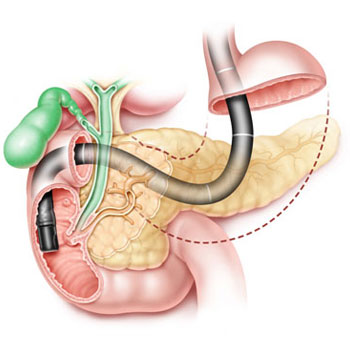Endoscopic Retrograde CholangioPancreatography in short ERCP is a medical procedure to diagnose and treat problems in the liver, gallbladder, bile ducts, and pancreas. In this procedure health provider uses the combination of X-ray and the use of an endoscope—a long, flexible, lighted tube.
Why ERCP is needed?
ERCP is used to determine the reasons behind the unexplained abdominal pain or yellowing of the skin and eyes (jaundice). It also is used to find more findings in pancreatitis or cancer of the liver, pancreas, or bile ducts. Other medical information that may be found with ERCP including:
- Blockages or stones in the bile ducts
- Fluid leakage from the bile or pancreatic ducts
- Blockages or narrowing of the pancreatic ducts
- Tumors
- Infection in the bile ducts
- Acute recurrent pancreatitis
- Injuries to the duct
- Gallstone disease causing pancreatitis
- Inflammatory disorders affecting the pancreas
- Stones blocking the pancreatic duct
- Narrowing (strictures) within the duct
- Abnormal anatomy of the pancreas or duct

How to get ready for ERCP?
Suggestions for ERCP preparation include the following:
- Need to discuss with the healthcare provider if you are sensitive/ allergic to any medicines, latex, tape, or anesthesia.
- Do not to eat or drink liquids for 8 hours before the procedure.
- Special diet has to be followed according to the doctor’s suggestion for 1 to 2 days before the procedure.
- If you are pregnant or think you could be, must notify your healthcare provider.
- Inform your doctor regarding your medical history and disease history prior to the procedure.
- If you have heart valve disease, your healthcare provider may give you antibiotics before the procedure.
How to get ready for ERCP?
The procedure ERCP completes in 1-2 hours. The Health Provider follows below steps
- Locates the opening where the bile and pancreatic ducts empty into the duodenum
- Slides a thin, flexible tube called a catheter through the endoscope and into the ducts
- Injects a special dye, also called contrast medium, into the ducts through the catheter to make the ducts more visible on x-rays
- Uses a type of x-ray imaging, called fluoroscopy, to examine the ducts and look for narrowed areas or blockages
What are the risks of ERCP?
The risks of ERCP include complications such as the following:
- Pancreatitis - inflammation of the pancreas
- Infection of the bile ducts or gallbladder
- Excessive bleeding, called hemorrhage
- An abnormal reaction to the sedative, including respiratory or cardiac problems
- Perforation in the bile or pancreatic ducts, or in the duodenum near the opening where the bile and pancreatic ducts empty into it
- Tissue damage from x-ray exposure
When should see the doctor after procedure?
Visit your best liver specialist in Hyderabad if you experience the following symptoms:
- Chest pain or difficulty breathing.
- Fever, or other signs of infection.
- Severe, worsening abdominal pain or sore throat.
- Signs of rectal bleeding, such as dark, tarry-looking stool.
- Vomiting.
Consult Dr. Y. Rami Reddy who is the best gastroenterology doctor in Hyderabad at ERCP hospitals in Shaikpet uses state-of-the-art technologies for effective treatment. Visit for gallbladder disease treatment in shaikpet. We are providing our services at Gachibowli, Hitec city, Manikonda, Kondapur, Madhapur, banjara hills, jubilee hills, kphb colony and kukatpally
